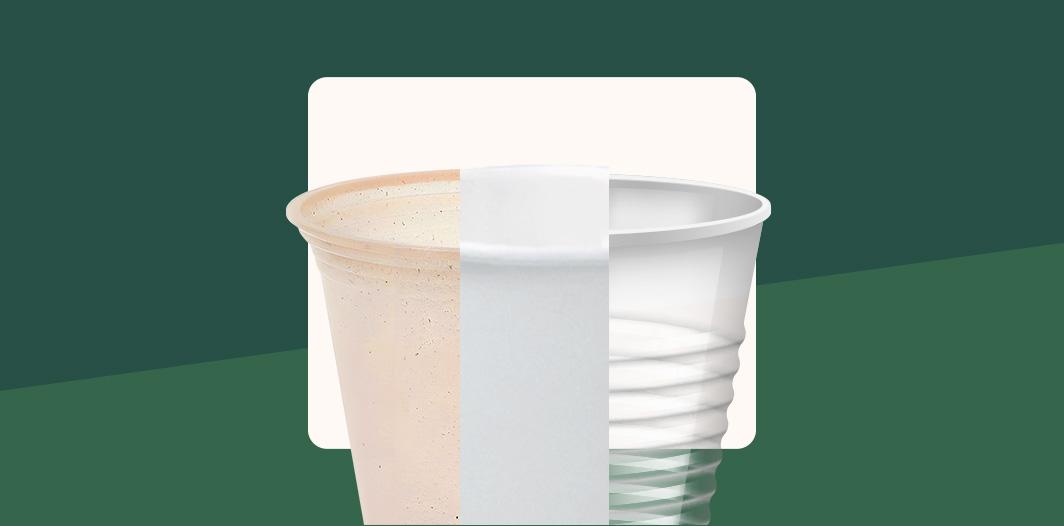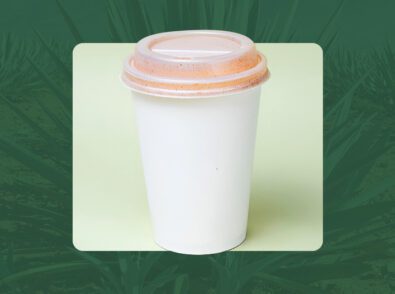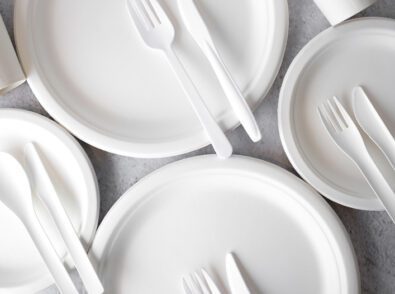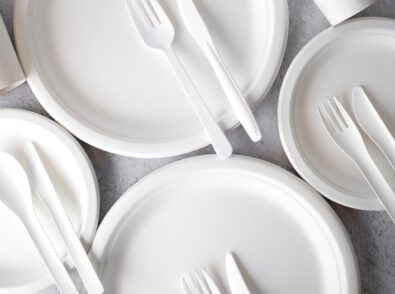Plastic Cups vs. Paper Cups vs Agave Cups

Sustainable and eco-conscious living is an important topic for many individuals and organizations today. Businesses and consumers are asking themselves how they can reduce their environmental impact and contribute to global sustainability goals. One way to promote positive change is to make more informed choices about the items you use each day, like single-use dishware.
Reducing the extensive harm of plastic products is one of the biggest missions in current conversations around sustainability, so finding alternatives for frequently used items like cups makes a significant impact. However, choosing the most sustainable options can also feel like a challenge. Here are the factors you should consider when choosing between plastic cup alternatives like paper cups vs. agave options.
Factors to Consider When Choosing Between Plastic, Paper and Agave Cups
To help you choose the most sustainable yet practical plastic cup substitute, keep these factors in mind.
Environmental Impact and Sustainability
Sustainability is essential to selecting a plastic cup alternative, especially for high-volume use in professional or business settings. Determining whether a material is renewable means thinking about what happens once the manufacturer has collected the raw materials they need to produce their cups. How quickly can that material regenerate?
Plastic cups are made from limited and harmful petroleum resources, and the process of extracting petroleum and producing the cups makes plastic a non-regenerative option. Although plastic can be recycled, some types of plastic need specialized recycling, making the process difficult.
Paper cups, on the other hand, require extensive deforestation, water use, and energy consumption to make. Although paper cups are made from wood fibers from trees that can be replanted, regrowing mature trees can take years. Paper cups, however, do offer better recycling and renewability advantages over plastic, as production by-products can be used for other processes, and the cups are more compatible with recycling processes.
Of the three, agave has the greatest environmental and sustainability benefits. Agave-based products are biodegradable, reducing waste and pollution and breaking down within three years. Agave, a highly renewable resource, also grows swiftly and can be sourced as a by-product of tequila-making processes. These facts mean agave cups can be made with minimal impact on forestry and the environment.
Health Considerations
Disposable cups are a staple in many industries like foodservice and healthcare, so it’s important to consider the wellness impact cup materials can have. Plastic cups can release chemicals and additives into drinks, especially when they’re heated. These toxins can result in health issues. The thin, waterproofing coating in paper cups, often made from bioplastics, can also have adverse health effects. Food-safe cups made from all-natural agave fibers do not contain harmful plastics or chemicals.
Durability
Depending on their construction, plastic, paper, and agave can all offer dependability. Plastic is a durable and malleable material, and paper cups are often reinforced with plastic to minimize leaking and breakage. Agave cups combine a sustainable alternative with reliability without requiring a coating. These options resist sogginess and can hold hot and cold drinks without losing their shape.
Consumer Experience
Modern-day consumers view sustainability as crucial in guiding their purchasing decisions and brand choices. Choosing the most eco-conscious option impacts your customer relationships and brand image. Between plastic, paper, and agave, the latter is the most sustainable choice. Since it also offers superior structural integrity, your customers can enjoy their drinks without the cup starting to break down.
Cost
When determining the cost of paper vs. plastic cups or agave substitutes, several factors may influence each option’s price. The cost of a wholesale batch of disposable cups can depend on the cup size, customization, quantity, material quality, shape, and more.
For standard 16oz cups, plastic options are the cheapest, but they offer limited use as they’re only ideal for cold drinks. Paper cups are more affordable than agave options but do not provide the structural integrity and durability of options made from other materials. Agave cups, though they cost more money, are robust and more suitable for holding liquids of any temperature, allowing you to use one type of cup for any drink.
The Final Verdict on Plastic Cups vs. Paper Cups vs. Agave Cups
Considering the above factors, agave offers the most cost-efficiency in all aspects. While it requires a higher initial investment, it also provides bigger returns for companies in terms of brand reputation and reaching their sustainability goals.
For consumers choosing between plastic cups vs. agave and paper, agave provides more versatility and eco-friendliness. Since they’re made of fiber, agave decomposes without leaving behind microplastics that can be harmful to human health and the planet.
What Are Agave Cups and How Are They Produced?
Disposable products made of agave fibers are upcycled from the waste of tequila production. This renewable resource reduces the demand for farmed and natural resources, making it a sustainable alternative to plastic and paper. Agave-based products, including paper cups, utensils, and plates, are characterized by their durability and robust construction.
Greenprint manufactures disposable foodservice products made of agave. We produce our cups and other solutions by responsibly collecting and extracting agave fibers from mature agave plants. Drying and processing follow to ensure the pliability of the material, and then we mold them into shapes and sizes for various uses.
Our agave-based cups have undergone extensive testing that proves they decompose within one to three years in active landfills. We value traceability and quality assurance, using only quality plant fibers to produce trusted cups, straws, and cutlery made of agave compounds.
Switch to Agave Cups Today
Whether you’re a business looking for durable yet eco-friendly containers or an individual looking for a better option than a paper cup, agave is the best solution between plastic and its replacements. It is durable, sustainable, and renewable, allowing it to improve user experience and offer a viable plastic and paper cup alternative.
Greenprint offers a wide selection of eco-friendly agave-based products for your businesses and industrial facilities. Designed for ease of use and cost-efficiency, our agave cups, straws, and cutlery are the green choice for you. Shop the best agave foodservice products with us today!





